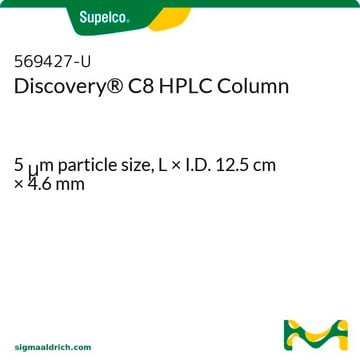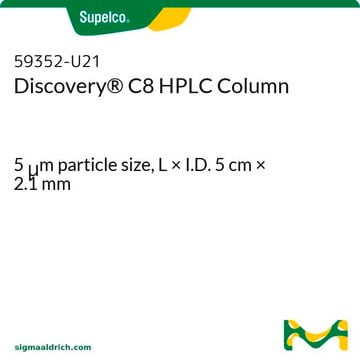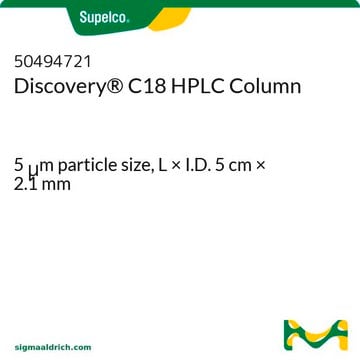59354-U30
Discovery® C8 (5 µm) HPLC Columns
L × I.D. 25 cm × 3 mm, HPLC Column
About This Item
Recommended Products
product name
Discovery® C8 HPLC Column, 5 μm particle size, L × I.D. 25 cm × 3 mm
material
stainless steel column
Agency
suitable for USP L7
product line
Discovery®
feature
endcapped
manufacturer/tradename
Discovery®
packaging
1 ea of
extent of labeling
7.5% Carbon loading
parameter
≤70 °C temp. range
400 bar pressure (5801 psi)
technique(s)
HPLC: suitable
LC/MS: suitable
L × I.D.
25 cm × 3 mm
surface area
200 m2/g
surface coverage
3.4 μmol/m2
impurities
<10 ppm metals
matrix
silica gel, high purity, spherical base material
fully porous particle
matrix active group
C8 (octyl) phase
particle size
5 μm
pore size
180 Å
operating pH range
2-8
application(s)
food and beverages
separation technique
reversed phase
Looking for similar products? Visit Product Comparison Guide
Features and Benefits
- Excellent reproducibility
- Faster separation of strongly hydrophobic analytes than C18 columns
- Stable, low-bleed LC-MS separations
- Exceptional peak shapes for basic and acidic compounds
- Compatible with low organic/highly aqueous mobile phases
Legal Information
related product
Choose from one of the most recent versions:
Already Own This Product?
Find documentation for the products that you have recently purchased in the Document Library.
Related Content
Discovery C18 and C8 HPLC Columns products offered
Our team of scientists has experience in all areas of research including Life Science, Material Science, Chemical Synthesis, Chromatography, Analytical and many others.
Contact Technical Service






